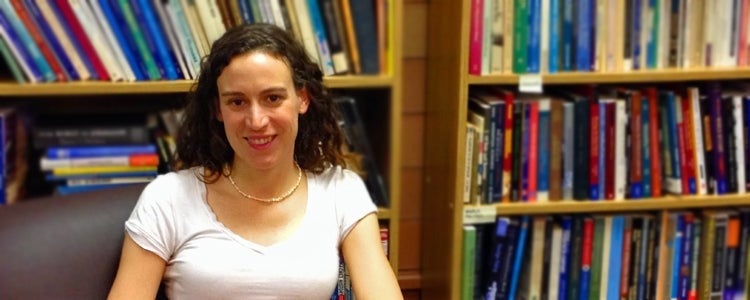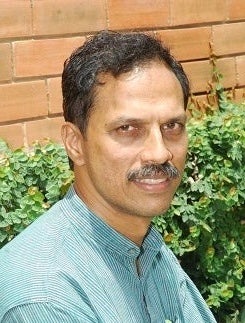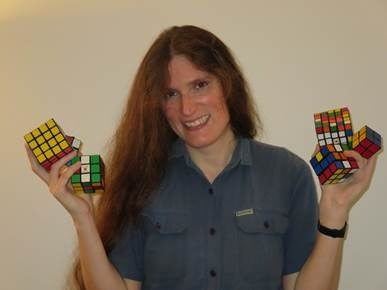Editor:
Brandon Sweet
University Communications
bulletin@uwaterloo.ca
Tales of a Teacher: Veronica Kitchen

by Sarah Forbes. This is the second of three Centre for Teaching Excellence Teaching Stories that will be featured in the Daily Bulletin this week.
If you walk into Dr. Veronica Kitchen’s World Politics class, you might think you’ve taken a wrong turn into the Drama department. Unlike a typical political science lecture, her students spend class time participating in games and active demonstrations that subtly mimic the real-world circumstances of politics. These games, according to Kitchen, allow students to take a break from sitting still and listening, as well as allow them to organically reach conclusions that mirror what academics have learned by observing the real world of politics.
In her eight years of teaching, Kitchen has always aimed to make her political science courses flexible, interesting, and memorable for each student. "That's because," she says, “students are unique and interesting people.” In her experience, two sections of the same course can turn out radically different depending on the students in the class and their interests. This perspective leads Kitchen to experience teaching as novel and exciting in every class. It’s also part of why she chooses to have a public Twitter account, where she creates a hashtag for each of her courses (like this one), which she uses to post extra content related to each course. By following her Twitter feed, students can see that she’s human just like them. “It makes the looks of shock when they see me at the grocery store go away,“ she laughs.
Kitchen’s perspective on teaching closely parallels her ideas about interaction, new technology, and student individuality. “Google will always win for mere answers,” she explains, “but students will still need a toolbox to help them interpret and act on information, and that’s what I hope to provide.” In her upper year classes, Kitchen allows her students to guide the topics they discuss each class. This way, they can use their existing skills and foundational knowledge to explore what they truly find interesting. To get them to this level, Kitchen has learned to act as a guide in the first-year courses, allowing students to get to answers in their own way in order to build their confidence and their ability to navigate information.
The experiential learning in World Politics parallels this exploration. By providing interactive learning games for her students, Kitchen hopes that they’ll learn the ”deeper” lessons of political science. These go beyond theories to examine the interaction of factors such as frustration, anger, and trust – base human emotions that can influence negotiations in positive or negative ways. So far, it seems to be working. While fully integrating experiential learning into World Politics was just an experiment last year, she plans to continue it with slight modifications in the future. She’s looking forward to seeing students who have experienced experiential learning in her fourth-year seminars and beyond, and discovering where political science takes them in the future.
GreenHouse Co-op Pilot Relaunches
By Samantha Johns, WatCACE/GreenHouse Co-op Program Coordinator
Experiential education plays a critical role in the development of career-ready undergraduate students. To provide more opportunities for experiential education, the St. Paul’s GreenHouse and the WatCACE research team have re-launched the GreenHouse co-op pilot, run previously in the Winter of 2014.
As part of the University’s strategic plan, the pilot contributes to the employment and development of first work term students, while building relationships with potential new co-op employers. The pilot offers 12 first work term co-ops the opportunity to experience being a “Social Entrepreneur in Training”, rotating through three different social start-ups from February to April. The students are provided with a comprehensive training week prior to working in the first organization, to ensure they are prepared for the demands and culture of the start-up environment.
In addition to the support provided by their CECA student advisor, the students will also have the support of a program coordinator who will act as the liaison between the students and their employers. Unlike a typical co-op program, students will be matched in pairs and assigned to specific employers by the program coordinator who will have a good understanding of the students’ skills and interests for learning and development.
This term, we have selected a very diverse group of students to participate in the pilot. The students come from a wide variety of academic programs, and many have previous experience contributing to various social causes. The passion and determination of these students is unmatched – they are ideal candidates for success in this pilot.
Social start-ups interested in being part of this Winter 2016 program can contact Samantha Johns for more information: sljohns@uwaterloo.ca
Bridging divides over water issues
The Water Institute is continuing its 2015-2016 WaterTalks Lecture series tomorrow with an event featuring Professor Sharachchandra Lélé, senior fellow at the Ashoka Trust for Research in Ecology and Environment in Bangalore, India.
The talk is entitled “Bridging many divides: building an interdisciplinary understanding of water issues in a developing country context.”

Lélé is a highly interdisciplinary environmental scholar who bridges the natural sciences, economics, and political science in understanding the concepts of and pathways to environmentally sustainable and socially just development. He combines an interest in the concepts of sustainable development, sustainability and environmental justice with an urge to do knowledge generation that is more directly linked to change on the ground by balancing academic and applied research and teaching. His empirical work has focused on issues in forest and water resource management in South Asia.
“Water problems in general are ‘wicked’ problems that demand an interdisciplinary approach to addressing them,” says the talk’s abstract. “In developing countries like India, the pressing nature of water problems does not permit the luxury of fragmented analysis. But carrying out interdisciplinary and change-relevant research is easier said than done, especially within academia. On the one hand, it involves bridging the research-action divide. On the other hand, it involves bridging not just the ‘big divide’ between the natural and social sciences, but also the ‘bigger divide’ within the social sciences. And sometimes it requires bridging the gap between what reality seems to demand and what donors seem to be bothered about!”
In his lecture, Lélé will explore the multi-dimensional nature of these divides, with examples from water research in India, arguing that adopting a ‘problem-driven’ approach and explicitly embracing multiple normative concerns and multi-causality offers a way towards more socially meaningful and rigorous research.
The event takes place on Thursday, January 28 at 2:30 p.m. in DC 1302 and will be livestreamed.
Wednesday's notes
Employers on campus next week hosting employer information sessions include Arista Networks, Shopify, Atomic Labs, Pacific Services Canada Limited, Essroc, National Instruments, Zenefits, Cisco, SAP, Wave, Wattpad, Canon Innovation Lab, ProgressSoft Corporation, Apple, DRI Capital Inc., and Dropbox.
Would you like to know more about the GRADventure program? The Graduate Studies Office invites graduate students, graduate faculty, program coordinators and other graduate studies stakeholders to the GRADventure launch event today in Needles Hall 3318. Drop in any time between 1:00 p.m. and 2:30 p.m. for some coffee and sweets, and to learn more about GRADventure. A few short speeches will begin at 1:30 p.m.

Stop by MC 5501 from 3:30 p.m. to 5:00 p.m. today to see The Women in Math Winter Lecture: "Mathematics of Rubik’s cube." How many positions does Rubik's cube have? If one disassembles Rubik's cube and puts it back together again randomly, will it be solvable? What is God's number? Speaker Matilde Lalin, Associate Professor at the University of Montréal, will answer all this and more - don't miss the mathematics of one of the most popular puzzles in history! All are welcome, no registration required.
Link of the day
When and where
Bell Let's Talk Day, Wednesday, January 27.
Noon Hour Concert: Everett Hopfner: Sounds Like Canada, Wednesday, January 27, 12:30 p.m., Conrad Grebel University College.
GRADventure Launch Event, Wednesday, January 27, 1:00 p.m., Needles Hall 3318.
Science Speed Networking Event, Wednesday, January 27, 5:20 p.m., EIT 1015.
Velocity Start presents What’s Your Problem?, Wednesday, January 27, 7:30 p.m., Velocity Start, SCH 2ndFloor.
"I've Got the Music in Me" - The Power of Music for People Living with Memory Loss and Dementia, Thursday, January 28, 11:30 a.m., Federation Hall.
Water Institute WaterTalk Lectur
by Sharachchandra Lele, Thursday, January 28, 2:30 p.m., DC 1302.
Knowledge Integration Seminar: KI alumni panel "Life after KI", Friday, January 29, 2:30 p.m., AL 113.
Retirement reception for David Taylor, Friday, January 29, 3:30 p.m., University Club.
FIRST Lego League Ontario West Provincial competition, Saturday, January 30, Physical Activities Complex Main Gym.
Board of Governors Meeting, Tuesday, February 2.
CrySP Speaker Series featuring Alison Macrina, Library Freedom Project, “Grassroots Surveillance Resistance at Your Local Library", Tuesday, February 2, 1:30 p.m., DC 1304.
Fundraiser for S.O.S. for Syria, Tuesday, February 2, 6:00 p.m., Renison Atrium.
Job Fair, Wednesday, February 3, 10:00 a.m. to 3:30 p.m., Manulife Sportsplex, RIM Park.
Noon Hour Concert: Music of the Future, Wednesday, February 3, 12:30 p.m., Conrad Grebel University College.
Retirement Celebration for Leo Rothenburg, Wednesday, February 3, 3:00 p.m. to 5:00 p.m., University Club. Please RSVP to Elle Clarke at e5clarke@uwaterloo.ca or ext. 33985 by January 25.
Velocity Start presents Ain’t No Model Like A Business Model, Wednesday, February 3, 7:30 p.m., Velocity Start, SCH 2nd Floor.
Bechtel Lecture Dinner with Dr. Janneken Smucker, “Abstract Art or Country Craft: The Quilts of the Amish,” Thursday, February 4, 6:30 p.m., Schlegel Community Education Room, Conrad Grebel University College. Contact Alison Enns (519) 885-0220 x 24217 or aenns@uwaterloo.ca for ticket information.
FASS 2016, Thursday, February 4, 8:00 p.m., Friday, February 5, 7:00 p.m., 10:30 p.m., Saturday, February 6, 6:00 p.m., Humanities Theatre.
Bechtel Lecture featuring Dr. Janneken Smucker, “Unexpected Intersections: Amish, Mennonite, and Hmong Textiles and the Question of Authenticity,” Friday, February 5, 7:00 p.m., Great Hall, Conrad Grebel University College.
The Ritual of the Calling of an Engineer, Saturday, February 6, 12:00 p.m., 1:00 p.m., 2:00 p.m. and 3:00 p.m., ML Theatre.
Faculty Seminar Series, featuring Angela Hildyard, "Leadership in the Post-Secondary Environment", Monday, February 8, 1:00 p.m to 3:30 p.m., Federation Hall, rooms A and B - register here.
Velocity Start presents Science Brainstorming, Tuesday, February 9, 7:30 p.m., Velocity Start, SCH 2ndFloor.
Noon Hour Concert: Michael Wood Trio, Wednesday, February 10, 12:30 p.m., Conrad Grebel University College.
Velocity Start presents Setup Your Business Like A Boss, Wednesday, February 10, 7:30 p.m., Velocity Start, SCH 2nd Floor.
Treat-a-Gram, Thursday, February 11. Orders are due Thursday, February 4.
WatCACE webinar, “The Co-op Workplace Support System and its Effects on Student Commitment to Work, Team, and Host Organization,” Thursday, February 11, 1:00 p.m., E5 2004. Livestream link. Contact Juden
Pretti at tjpretti@uwaterloo.ca for
more information.
Communication for the Workplace, Thursday, February 11, 2:30 p.m.
Family Day holiday, Monday, February 15, most university operations closed.
Battling Internet censorship and surveillance, "Find out how Ian Goldberg is combating Internet censorship and surveillance with privacy-enhancing technologies," Thursday, February 18, 12:00 p.m. to 1:00 p.m., DC 1302. Please register here – seating is limited.
Hagey Bonspiel, Saturday, February 20, 9:00 a.m., Ayr Curling Club.
Noon Hour Concert: Timepoints: The Toronto Percussion Ensemble, Wednesday, February 24, 12:30 p.m., Conrad Grebel University College.
Velocity Start presents Do People Want Your Sh*t?, Wednesday, February 24, 7:30 p.m., Velocity Start, SCH 2nd Floor.
UWSA Special General Meeting, Thursday, February 25, 9:00 a.m., DC 1302. Coffee and treats available at 8:45 a.m.
Master of Taxation Open House, Saturday, February 27, 10:00 a.m., Downtown Toronto.
Positions Available List:
- Job id# 3096 – Supervisor, Visitors Centre – Marketing & Undergraduate Recruitment – USG 6
- Job id# 3098 – Coordinator, International Student Experience Programs – Student Success Office – USG 7
- Job id# 3095 – Senior Fabrication Equipment Technologist– Institute for Quantum Computing – USG 9
- Job id# 3097 – Learner Support Representative – Centre for Extended Learning – USG 5
Internal Secondment Opportunities:
- Coordinator, Graduate Financial Aid & Awards – Graduate Studies Office – USG 8
- Graduate Coordinator – Conrad Business, Entrepreneurship & Technology Centre – USG 6
- Client Support Specialist (Waterloo Content Management System (WCMS) – Information Systems & Technology – USG 7
- Undergraduate Studies Coordinator – Dean of Science Office (Science Undergraduate Office) and Earth Environmental Sciences – USG 7